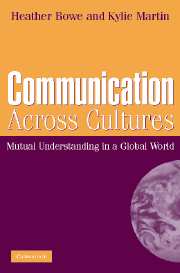Book contents
- Frontmatter
- Contents
- List of figures
- List of tables
- Transcription conventions
- Preface and acknowledgments
- Chapter 1 Culture, communication and interaction
- Chapter 2 Direct and indirect messages: The role of social context identified by Grice and Searle
- Chapter 3 Politeness and face
- Chapter 4 Speech acts and politeness across cultures
- Chapter 5 The analysis of conversation
- Chapter 6 Power relations and stereotyping
- Chapter 7 Naming and addressing: Expressing deference, respect, and solidarity
- Chapter 8 Cultural differences in writing
- Chapter 9 Interpreting and translating
- Chapter 10 Intercultural communication issues in professional and workplace contexts
- Chapter 11 Towards successful intercultural communication
- References
- Index
- References
Chapter 3 - Politeness and face
- Frontmatter
- Contents
- List of figures
- List of tables
- Transcription conventions
- Preface and acknowledgments
- Chapter 1 Culture, communication and interaction
- Chapter 2 Direct and indirect messages: The role of social context identified by Grice and Searle
- Chapter 3 Politeness and face
- Chapter 4 Speech acts and politeness across cultures
- Chapter 5 The analysis of conversation
- Chapter 6 Power relations and stereotyping
- Chapter 7 Naming and addressing: Expressing deference, respect, and solidarity
- Chapter 8 Cultural differences in writing
- Chapter 9 Interpreting and translating
- Chapter 10 Intercultural communication issues in professional and workplace contexts
- Chapter 11 Towards successful intercultural communication
- References
- Index
- References
Summary
All social groups havepreferred ways of speaking – for example, contemporary English greetings may include:
Hi, What's up? How's it going? G'day (Australian English), How are you? Hello, How do you do?
While How do you do? would be highly valued at a formal occasion, it would not be a good way to greet your friend in the morning. You would need something less formal, more cool, more humorous – even perhaps a loud groan! In this chapter we will examine what makes an utterance appropriate in a given social context but not in another. This basis will contribute to an understanding of parallel complexity in intercultural communication.
Most languages have differing styles of communication according to:
levels of familiarity (e.g. family, friends, acquaintances, strangers)
levels of formality (e.g. extremely formal to informal)
types of situations (e.g. professional, business, sport, private, public)
relative age
gender.
Getting these levels correct is often called socially appropriate behaviour or politeness.
Many people tend to think of politeness as the use of extremely formal language, but most linguists perceive politeness as a continuum of appropriate communication. Fraser (1990:220) cites the following example from the 1872 version of Ladies' Book of Etiquette and Manual of Politeness to illustrate the general folk perception of equating ‘politeness’ with ‘good manners’:
… avoid topics which may be supposed to have any direct reference to events or circumstances which may be painful. […]
- Type
- Chapter
- Information
- Communication Across CulturesMutual Understanding in a Global World, pp. 26 - 45Publisher: Cambridge University PressPrint publication year: 2007

